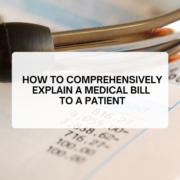Medical Bills Collections, and Your Credit Score and Upcoming Changes
Many people don’t realize that their credit report may contain medical bills in collection that can seriously affect their credit score. Even if you’ve been paying your credit cards, mortgage, rent, and other reportable lines, you may be surprised that medical bills carry their own weight when reported. Fortunately, you have more leeway when addressing these bills than other regular credit lines. In addition, they can be more easily removed from your credit report after they’re paid off. You should however monitor your credit report to make sure they are removed. Don’t forget to check all 3 major Credit Reporting Agencies, Equifax, Experian, and TransUnion.
According to the Consumer Financial Protection Bureau, approximately 31.6% of adults in the US have collection accounts on their credit reports. That’s an astounding 1 out of every 3 Americans. And, medical bills account for over half of all collections with an identifiable creditor. So, it stands to reason, that you may have a medical bill in collections. Even more probable if you’ve moved and aren’t receiving your bills. After a period of time, they are reported to a collection agency. After attempts to contact you via mail and or phone without arrangements being made by you, they will be reported to the credit agencies.
This can be really damaging to your credit history as it can affect your borrowing interest rates, your ability to secure financing, and secure employment as many employers pull your credit report.
Areas that you need to be aware of:
- Just because you have insurance and possibly good insurance, it doesn’t mean you will not owe anything. I would suggest you review your Evidence of Benefits (EOB) to get an idea of your responsibility. If in doubt about a bill, contact the medical provider as well as the insurance provider in the event of incorrect billing.
- It is possible to pay a medical bill and it is still sent to collections. This can be extremely frustrating. If you’re making small payments or paying even a few days late, the bill can be sent to collections. Fortunately, you can call the collection agency and make payment arrangements with them. You are given a grace period. They give you typically 180 days before they report to the credit agencies. If you pay it off and are on time you can generally avoid it hitting your credit report.
- Protections under the ACA give patients at a non-profit hospital time to apply for assistance before any extraordinary measures are taken. But remember, any unpaid balances can be and probably will be reported. I’ve seen bills hit a credit report with only a few dollars outstanding. The hit to your credit score is the same regardless of the amount!
- Be sure to make payment arrangements with the medical provider and get a copy of it in writing. Then pay off the bill according to the agreement. I will say over and over again, that keeping a copy of agreements/arrangements that you have with your insurance company and provider makes good business sense in the event you find a discrepancy and need documentation at a later date.
Managing Collection Calls
Whenever you’re contacted by a collection agency on behalf of a medical provider, have them send you a written confirmation of and a detailed itemized list of the debt as well as the right to dispute it. You have this right but you must do it in a timely manner. Again, make sure the bill is accurate. Compare it to the EOB. You should not be responsible for paying more than your responsible amount referenced on the EOB. After you’ve paid, keep a copy of the payment confirmations for a few weeks in the event you need to reference the transaction. It isn’t unheard of for things to cross in the mail, get lost, or even have payments applied to the incorrect patient account.
If you’re concerned about your credit and or bills, get a free credit report one time a year for free through credit.com. Credit.com will also provide an easily understandable breakdown of the information on your credit report. Additionally, credit agencies can give you pointers as to how to establish and repair your credit history. Credit is a very integral part of our financial lives. Keeping a good credit history can present options such as cheaper car insurance, and better interest rates on personal loans.
Upcoming Changes to Medical Bill Reporting
Make it a habit to review your credit reports regularly, Don’t assume you owe anything for medical visits. Ask for payment arrangements early and stick to them. Be proactive and free up time to do the things you’d rather be doing and not worry about collections and your credit report.
The good thing about medical bills and credit is the changes that go into effect in 2023. But before I get into that, for those who currently have medical bills on their credit reports, very few of those existing bills will change. The credit reporting system has long been used as a threatening tool to try to coerce people to pay bills they may not even owe.
Past research by the CFPB, suggests that medical collections are less predictive of future repayment risk than other collections or payment history on loans. Yet many creditors rely on older credit scoring models that penalize individuals with medical bill collections on their credit reports.
Fortunately, as a result of the changes, two-thirds of medical collections on credit reports will no longer be reported. Starting in 2023, medical collections tradelines with less than $500 will no longer be reported to credit bureaus. For those who have relatively small outstanding bills, the $500 watermark could mean a large reduction in coercive reporting. Therefore bettering their credit scores.
Not surprisingly there is a disparity in the beneficial impact of the proposed changes. Both geographically and racially. It is estimated that patients and families living in the northern and eastern states have a higher concentration of medical debt that is paid or they have lower medical debt balances. Consequently, these families are more likely to benefit from the changes.
Conversely, residents of lower-income those being the majority of Black or Hispanic will realize less of a benefit from the proposed changes. This is because they may have higher bills reporting to credit because they are less likely to be able to pay down or off their medical bills due to the lack of income. Therefore it is particularly prudent that these groups pay particular attention to programs that may help them reduce their medical debt burden prior to it being reported to the credit bureaus.
Knowing your financial responsibility ahead of treatment as well as working with your healthcare team to locate and secure payment options and arrangements can prevent the fall into financial stress.

Diahanna Vallentine, BCPA, Financial Empowerment Lead
In 2002 Diahanna and her husband received the news that her husband had MGUS, a precursor to Multiple Myeloma. Upon her husband death in 2013, Diahanna immediately decided to make it her mission to help patients and caregivers empower themselves to speak up and to position themselves as partners in their treatment. Diahanna became a Board-Certified Patient Advocate. She is currently the Financial Myeloma Coach for The Myeloma Crowd Foundation.










